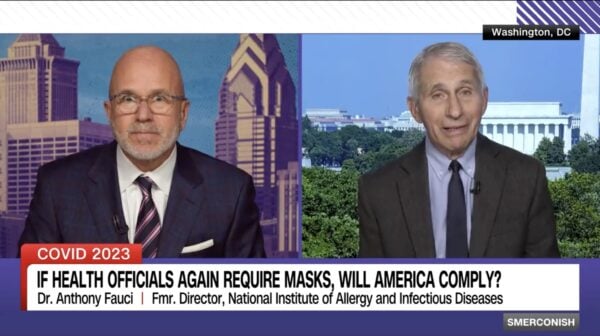
In a recent interview with Michael Smerconish, Dr. Anthony Fauci, one of the lead figures in America’s COVID-19 response, expressed a viewpoint on masks that raises questions about the empirical underpinning of his advice.
Fauci admitted that while masks are not a perfect solution, they do provide some degree of benefit. However, when pressed further on the conflicting results from various studies, including the widely cited Cochrane study, Fauci’s assurance crumbles.
The Cochrane review, led by Oxford epidemiologist Tom Jefferson, found just no evidence that masks make any difference in reducing the spread of respiratory illness, including COVID-19.
From the study:
There is uncertainty about the effects of face masks. The low to moderate certainty of evidence means our confidence in the effect estimate is limited, and that the true effect may be different from the observed estimate of the effect. The pooled results of RCTs did not show a clear reduction in respiratory viral infection with the use of medical/surgical masks. There were no clear differences between the use of medical/surgical masks compared with N95/P2 respirators in healthcare workers when used in routine care to reduce respiratory viral infection. Hand hygiene is likely to modestly reduce the burden of respiratory illness, and although this effect was also present when ILI and laboratory‐confirmed influenza were analysed separately, it was not found to be a significant difference for the latter two outcomes. Harms associated with physical interventions were under‐investigated.
This raises the question: If one of the most rigorous and comprehensive analyses on mask efficacy doesn’t support their use, why are public health officials like Fauci still urging us to wear them?
Here’s a brief history of mask recommendations given by Fauci and the CDC before:
- March 8, 2020 — Dr. Anthony Fauci advised healthy Americans against wearing face masks.
- April 2020 — The CDC said Americans should be wearing face masks for the COVID.
- May 2020 — Dr. Anthony Fauci and the New England Journal of Medicine have admitted that masks are little more than symbols. Virtue signaling.
- January 25, 2021 — Dr. Fauci told healthy Americans to wear two masks instead of one.
- January 31, 2021 — Dr. Fauci backtracked on that insane idea of wearing multiple masks.
- February 10, 2021 – The CDC claimed two masks are better than one.
- July 13, 2021 – Fauci said two-year-olds should mask up: “no doubt about that”
- And many more instances
In an email dated February 2020, Dr. Fauci advised a woman not to wear a face mask because they don’t protect against the virus.
“Masks are really for infected people to prevent them from spreading infection to people who are not infected rather than protecting uninfected people from acquiring infection. The typical mask you buy in the drug store is not really effective in keeping out virus, which is small enough to pass through material. It might, however, provide some slight benefit in keep out gross droplets if someone coughs or sneezes on you,” Fauci wrote. “I do not recommend that you wear a mask, particularly since you are going to a very low risk location. Your instincts are correct, money is best spent on medical countermeasures such as diagnostics and vaccines.”
“I do not recommend that you wear a mask” pic.twitter.com/6X0bueGcIB
— zerohedge (@zerohedge) June 2, 2021
During the interview, Dr. Fauci acknowledged that, when it comes to the effect of masks at a population level, “the data are less strong.” Yet, he immediately shifted the conversation to the benefits on an “individual basis.” This conveniently sidesteps the issue that policy recommendations are not made for isolated individuals but for the broader population.
“Yeah, but there are other studies, Michael, that show at an individual level, for individual, when you’re talking about the effect on the epidemic or the pandemic as a whole, the data are less strong,” said Fauci.
Dr. Fauci argues that the conversation should be focused on an individual’s effect on their own safety, as opposed to the broad population level. But is this not a false dichotomy? After all, isn’t the point of a public health recommendation to achieve a certain level of protection on a community or population scale?
“When you talk about as an individual basis of someone protecting themselves or protecting themselves from spreading it to others, there’s no doubt that there are many studies that show that there is an advantage. When you look at the broad population level, like the Cochrane study, the data are less firm with regard to the effect on the overall pandemic. But we’re not talking about that. We’re talking about an individual’s effect on their own safety. That’s a bit different than the broad population level,” said Fauci.
WATCH:
CNN asks Fauci why the highest quality scientific evidence consistently shows that masks do not work?
“The most rigorous and comprehensive analysis of scientific studies conducted on the efficacy of masks for reducing the spread of respiratory illnesses — including Covid-19 —… pic.twitter.com/GUdGak0AZh
— KanekoaTheGreat (@KanekoaTheGreat) September 3, 2023
